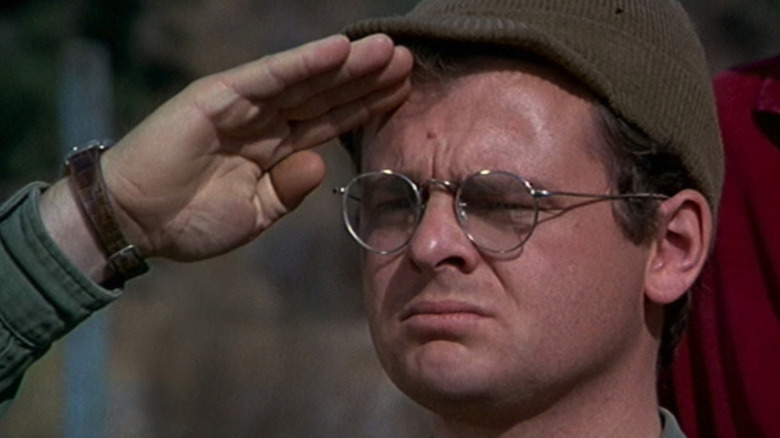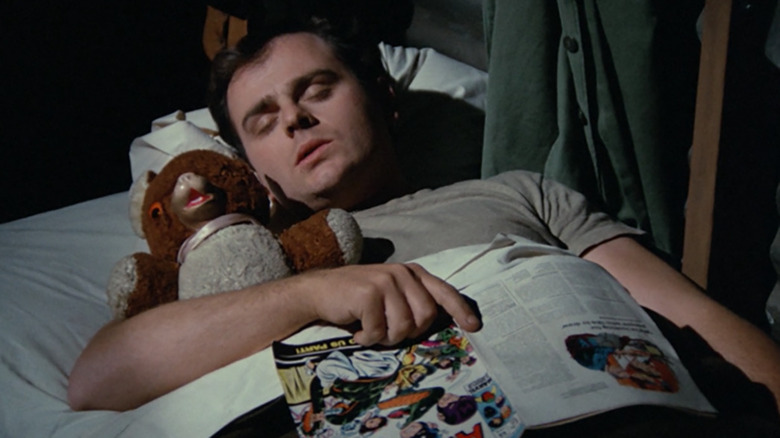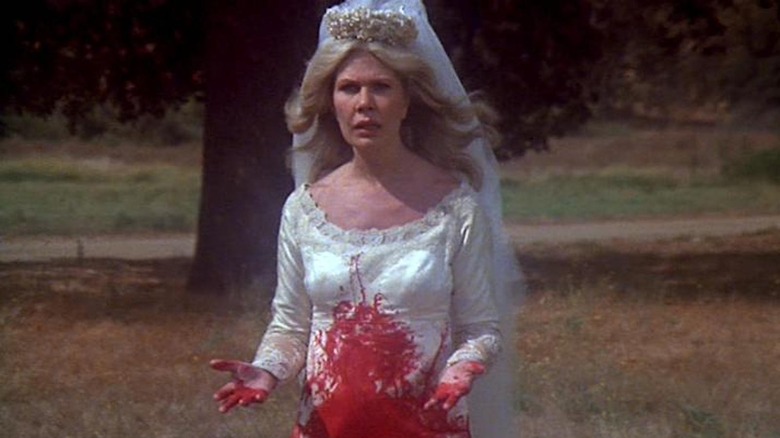Gary Burghoff Wrote A Radar-Centric M*A*S*H Episode We'll Sadly Never Get To See
Over its 11-season run, "M*A*S*H" earned a reputation for pushing the boundaries of the sitcom format. Amazingly, mainstream audiences generally rolled with this conceptual adventurousness. Indeed, one of the series' most famously experimental episodes, "The Interview" (shot in black-and-white from the perspective of a newsreel crew as they pepper the unit's doctors, nurses, and officers with questions about their experiences in the ongoing Korean War), is both a critical and fan favorite. As long as the writers stayed true to the characters, viewers were down for just about anything.
This boldness inspired the show's actors to get in on the fun and conjure up unconventional stories that dug deep into their characters' psyches. Cast members Alan Alda, Mike Farrell, Mary Kay Place, and McLean Stevenson all wrote episodes, many of which were excellent (Alda proved especially gifted at writing and directing, leading to a successful filmmaking career in the 1980s).
But not everyone got their scripts into production and on the air. Gary Burghoff, who played the 4077th's boyish company clerk Corporal "Radar" O'Reilly, had a fascinatingly fanciful idea for an episode that impressed series creator Larry Gelbart. He was hopeful his script would go before cameras, but, sadly, that day never came. Even worse, it seems likely that the writers nicked his idea for an episode shot after Burghoff departed the series. It's a shame because Burghoff's premise sounded much more promising.
Someone put the kibosh on it
According to Ed Solomonson and Mark O'Neill's "TV's M*A*S*H: The Ultimate Guide Book," Burghoff's teleplay, titled "Radar's Dream," was inspired by the character's love of comic books. In Berghoff's script, Radar has a dream where he becomes a superhero. "I had Radar actually getting taller," said Berghoff, "Having him walk on unseen 6-inch ramps that inclined on the floor. And, he ends the war."
This actually sounds like the sweet, sentimental counterpart to Dr. Manhattan winning the Vietnam War for the United States in Alan Moore and Dave Gibbons' "Watchmen," and I dearly wish it existed. Why didn't they ever make it? Per Berghoff:
"Gelbart loved it and wrote me a letter saying we'll do it. Someone put the kibosh on it. Well, I honestly think that they (some 'M*A*S*H' people) honestly thought of me as this man/boy like Radar was. So I think that contributed to my not getting to direct or having a script produced. They always saw me come in as Radar. I had just come from doing 'You're a Good Man, Charlie Brown' where I was playing a 5-year-old. It was actually a step up to play Radar. I guess I didn't have that persona on the set that I could do it (write or direct)."
So what about the episode that possibly borrowed/stole from Burghoff's idea?
I just couldn't convince them I wasn't this man/boy
"Dreams," written and directed by Alan Alda (from a story by James Jay Rubinfier), was the 22nd episode of the series' eighth season (which wound up being, by his choice, Burghoff's final year on the show). In it, the company is deluged with wounded soldiers, forcing them to work long hours on very little sleep. When the characters do rest, they are tormented by intense dreams that leave them rattled. Hawkeye finds himself back in medical school, where he does not know how to reattach a severed limb; Hot Lips imagines herself getting married, only to have her nuptials interrupted by her husband going off to war (leaving her in a blood-splattered white dress); Klinger dreams he's back in his hometown of Toledo, Ohio, which is deserted (he does drop by his beloved Tony Packo's Cafe, but the interior is an operating room where he is the patient). Other characters experiencing disturbing dreams are Hunnicutt, Winchester, Potter, and Mulcahy.
It had to sting Burghoff to not only see his concept appropriated but to be completely left out of the main narrative. Perhaps his superhero concept was too expensive? In any event, though "Dreams" was critically acclaimed, it left the show's fans cold (per Alan Alda on his Clear+Vivid podcast).
As for Burghoff, he's still disappointed about how he was treated. As he related to Solomonson and O'Neill: "I look at that script of mine and think, 'this could have flown.' Funny thing is, I'd already had a lot more experience than some of the others on the set. But I just couldn't convince them I was not this man/boy."


